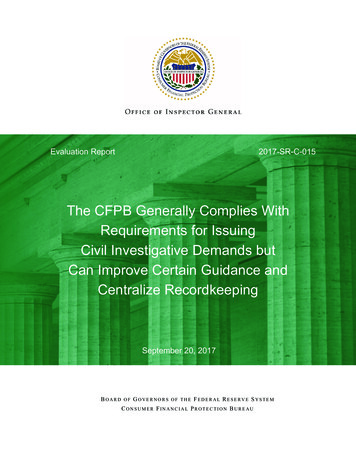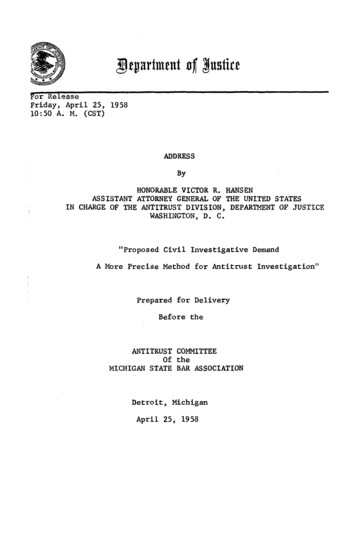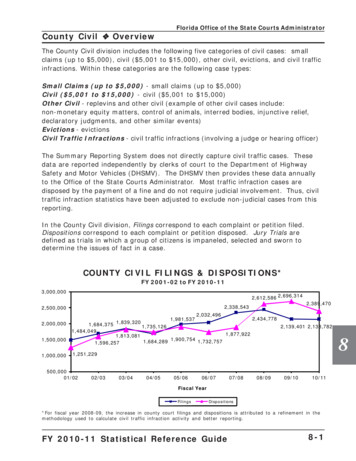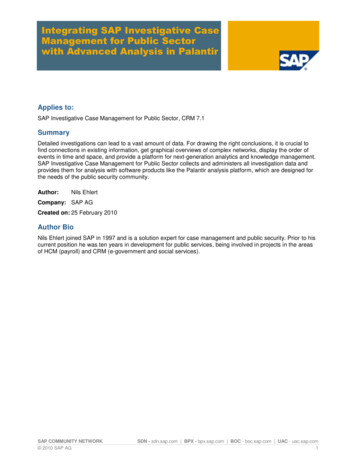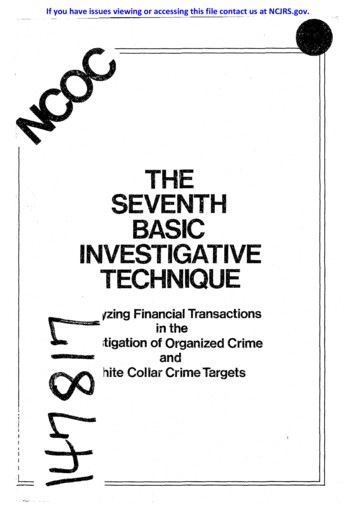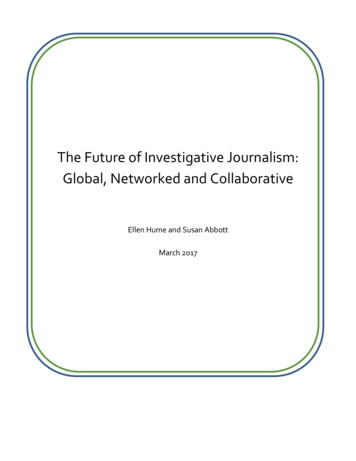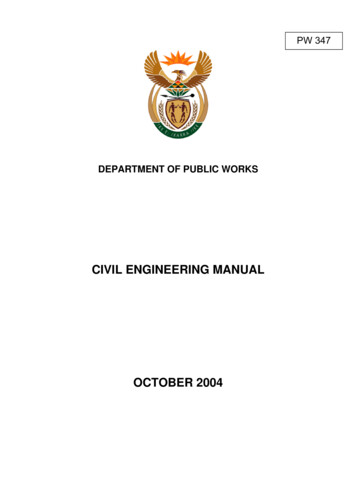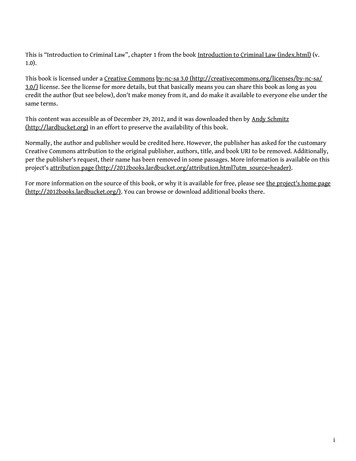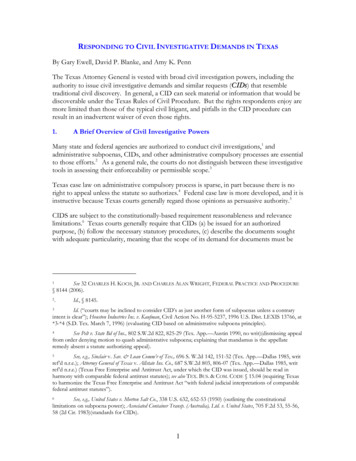
Transcription
RESPONDING TO CIVIL INVESTIGATIVE DEMANDS IN TEXASBy Gary Ewell, David P. Blanke, and Amy K. PennThe Texas Attorney General is vested with broad civil investigation powers, including theauthority to issue civil investigative demands and similar requests (CIDs) that resembletraditional civil discovery. In general, a CID can seek material or information that would bediscoverable under the Texas Rules of Civil Procedure. But the rights respondents enjoy aremore limited than those of the typical civil litigant, and pitfalls in the CID procedure canresult in an inadvertent waiver of even those rights.1.A Brief Overview of Civil Investigative PowersMany state and federal agencies are authorized to conduct civil investigations,1 andadministrative subpoenas, CIDs, and other administrative compulsory processes are essentialto those efforts.2 As a general rule, the courts do not distinguish between these investigativetools in assessing their enforceability or permissible scope.3Texas case law on administrative compulsory process is sparse, in part because there is noright to appeal unless the statute so authorizes.4 Federal case law is more developed, and it isinstructive because Texas courts generally regard those opinions as persuasive authority.5CIDS are subject to the constitutionally-based requirement reasonableness and relevancelimitations.6 Texas courts generally require that CIDs (a) be issued for an authorizedpurpose, (b) follow the necessary statutory procedures, (c) describe the documents soughtwith adequate particularity, meaning that the scope of its demand for documents must beSee 32 CHARLES H. KOCH, JR. AND CHARLES ALAN WRIGHT, FEDERAL PRACTICE AND PROCEDURE§ 8144 (2006).12.Id., § 8145.3Id. (“courts may be inclined to consider CID’s as just another form of subpoenas unless a contraryintent is clear”); Houston Industries Inc. v. Kaufman, Civil Action No. H-95-5237, 1996 U.S. Dist. LEXIS 13766, at*3-*4 (S.D. Tex. March 7, 1996) (evaluating CID based on administrative subpoena principles).4See Pelt v. State Bd of Ins., 802 S.W.2d 822, 825-29 (Tex. App.—Austin 1990, no writ)(dismissing appealfrom order denying motion to quash administrative subpoena; explaining that mandamus is the appellateremedy absent a statute authorizing appeal).5See, e.g., Sinclair v. Sav. & Loan Comm’r of Tex., 696 S. W.2d 142, 151-52 (Tex. App.—Dallas 1985, writref’d n.r.e.); Attorney General of Texas v. Allstate Ins. Co., 687 S.W.2d 803, 806-07 (Tex. App.—Dallas 1985, writref’d n.r.e.) (Texas Free Enterprise and Antitrust Act, under which the CID was issued, should be read inharmony with comparable federal antitrust statutes); see also TEX. BUS. & COM. CODE § 15.04 (requiring Texasto harmonize the Texas Free Enterprise and Antitrust Act “with federal judicial interpretations of comparablefederal antitrust statutes”).See, e.g., United States v. Morton Salt Co., 338 U.S. 632, 652-53 (1950) (outlining the constitutionallimitations on subpoena power); Associated Container Transp. (Australia), Ltd. v. United States, 705 F.2d 53, 55-56,58 (2d Cir. 1983)(standards for CIDs).61
adequate, but not excessive for the purposes of the inquiry, and (d) avoid unnecessaryburden and excessive redundancy with information the agency already possesses.72.The Statutory Sources of the Attorney General’s CID PowersThree Texas statutes authorize the Attorney General to issue CIDs:The first is the Texas Free Enterprise and Antitrust Act (TFEAA), which charges theAttorney General with responsibility to investigate potential violations of state and federalantitrust laws, and review proposed mergers to determine if they will substantially lessencompetition.8 These investigations are often conducted jointly with the Federal TradeCommission, the U.S. Department of Justice, and other state attorneys general.9The second statute is the Texas Medicaid Fraud Prevention Act, under which the AttorneyGeneral’s office and qui tam plaintiffs have recovered hundreds of millions of dollars inrecent years.10 Medicaid Fraud investigations frequently involve authorities with criminaljurisdiction, as well as federal agencies.The third statute is the Texas Deceptive Trade Practices Act (DTPA), which empowers theAttorney General to investigate potential violations of the consumer safeguards in Chapter17 of the Texas Business and Commerce Code.11See Sinclair, 696 S.W.2d at 151-52 (“(1) The agency must conduct its investigation pursuant to anauthorized purpose and the subpoena must be relevant to that purpose. (2) The agency must follow thenecessary statutory procedures. (3) The subpoena must describe the documents sought with adequateparticularity. This means that the scope of its demand for documents must be adequate, but not excessive, forthe purposes of the inquiry. (4) The subpoena must not unnecessarily or excessively seek information whichthe agency already possesses. (5) The respondent may show that the subpoena is unnecessarily burdensome tohim.”); Houston Industries Inc., 1996 U.S. Dist. LEXIS 13766, at *3-*4 (“subpoenas should only be enforcedwhere (1) the inquiry is within the statutory subpoena authority of the agency, (2) the demand is notunreasonably broad or burdensome, and (3) the information sought is reasonably relevant to the investigation”)(citing Burlington Northern R.R. Co. v. Office of Inspector General, 983 F.2d 631, 638 (5th Cir. 1993)).78See TEX. BUS. & COM. CODE § 15.10(b).Office of The Attorney General, Antitrust Division, ml (last visited September 24, 2014).9TEX. HUM. RES. CODE §§ 36.001-132; see generally Jack Meyer and Chris Wolff, Fighting Medicaid Fraudin Texas 1 (March 2013) (finding that from 2006 through 2012 Texas recovered over 821 million for state andfederal taxpayers after subtracting the relators’ (citizen plaintiffs) shares and the state’s attorneys’ fees andcosts), available at www.taf.org (last visited Jan. 30, 2015).1011The Attorney General also enjoys a broad right to inspect corporate books and records under theTexas Business Organizations Code. See TEX. BUS. ORGS. CODE § 12.151 (authorizing the Attorney General toinspect the books and records any “filing entity” or “foreign filing entity” to the extent he “considers necessaryin the performance of a power or duty of” his office); Humble Oil & Refining Co. v. Daniel, 259 S.W.2d 580, 588(Tex. Civ. App.—Beaumont 1953, writ ref’d n.r.e.) (granting partial relief under a declaratory judgment actionchallenging a request to examine); Chesterfield Finance Co. v. Wilson 328 S.W.2d 479, 482-83 (Tex. Civ. App.—Eastland 1959, no writ) (holding the Attorney General was vested with unrestricted power to examine and copyrecords to investigate potential usury).2
3.The Individuals and Entities the Attorney General is Statutorily-Authorized toServe Versus Those He Purports to ServeIn general, the Attorney General may serve a CID on not only a target of the investigation,but also any other individual or entity believed to have relevant information.12 CIDstypically define the recipient “Company” broadly to include affiliated entities (e.g., parentcorporations, subsidiaries, joint ventures) and individuals (e.g., directors, officers, agents,attorneys, and consultants).13 Thus, CIDs often presume to reach entities and individualswith little or no connection to Texas or the subject matter of the investigation.For many corporate respondents, this expansive definition can raise several issues regardingthe extent of their compliance obligations: A respondent’s document production obligation attaches only to material in its“possession, custody, or control,”14 which the Texas Supreme Court has construed toinclude the legal right to possess or obtain the material, as opposed to naked possession ormere access.15 In the case of affiliated corporations (or other entities), they frequently lackany legal right to each other’s documents.16 Relatedly, subsidiaries and parent corporations are deemed “separate and distinct‘persons’ as a matter of law,” and Texas courts are bound to honor the distinction betweenthem even where one company “may dominate or control, or even treat another company asa mere department, instrumentality, or agency.”17 In civil discovery, the Texas Rules place12See TEX. BUS. & COM. CODE § 15.10(b).See, e.g., Civil Investigative Demand to Google, Inc. at 6 (July 29, 2010) (definition of “you,” “your,”“the Company,” “Google,” and “Google, Inc.” in antitrust CID), available at http://www.josemilagre.com.br(last visited Sept. 25, 2014); Civil Investigative Demand to Trump University at 4 (Jan. 6, 2010) (definition no. 1for “you” and “your” in DTPA CID); Civil Investigative Demand to Patriot Leasing Company at 6 (Oct. 27,2004) (definition no. 1 for “Company” in DTPA CID).1314TEX. BUS. & COM. CODE ANN. § 15.10(b).See In re Hal G. Kuntz, 124 S.W.3d 179, 183-84 (Tex. 2003) (“Like a bank teller with access to cash inthe vault, [an employee] has neither possession nor any right to possess [his employer’s] trade secret[documents].”); GTE Communications Sys. Corp. v. Tanner, 856 S.W.2d 725, 729 (Tex. 1993) (“The right to obtainpossession is a legal right based upon the relationship between the party from whom a document is sought andthe person who has actual possession of it.”) (emphasis added).1516See, e.g., Power Integrations, Inc. v. Fairchild Semiconductor Int’l, Inc., 233 F.R.D. 143, 145 (D. Del. 2005) (“Asubsidiary, by definition, does not control its parent corporation.”); In re Uranium Antitrust Litig., 480 F. Supp.1138, 1144-45, 1151-52 (N.D. Ill. 1979) (holding documents of parent’s foreign, wholly-owned subsidiarieswere within the parent corporation’s control but those of 43.8%-owned subsidiaries were not).17In re U-Haul Int’l, Inc., 87 S.W.3d 653, 656-57 (Tex. App.—San Antonio 2002, orig. proceeding)(reversing sanctions against responding party for failing to produce its’ affiliates’ documents); Am. Maplan Corp.v. Heilmayr, 203 F.R.D. 499, 501-02 (D. Kan. 2001) (cited with approval in In Re Kuntz, the district court heldthat the president and minority shareholder of nonparty corporation could not be compelled to producecorporate documents in a suit brought against him personally absent evidence he was the alter ego of thecorporation).3
the burden on the requesting party to come forward with evidence that overcomes thiscorporate maxim.18 Finally, where the definition of the recipient company reaches unnamed affiliates,there is reason to question whether the Attorney General has any “reason to believe” theypossess pertinent material, and whether the entity in fact has any connection to the subjectmatter of the investigation.194.CID BasicsDeadlines. CIDs are not subject to the familiar 30-day response periods for writtendiscovery under Texas and Federal Rules.20 The antitrust CID procedures set a concretetimeline for a limited category of document requests addressed below; otherwise, theAttorney General is given wide discretion in setting deadlines.21Scope. The CID statutes incorporate the discoverability standards in the Texas Rules ofCivil Procedure.22 Like the Federal Rules, the Texas Rules define the permissible scope ofdiscovery broadly:See In re U-Haul Int’l, Inc., 87 S.W.3d at 656 (“The plaintiffs had the burden of proving UHI hadconstructive possession or the right to obtain possession of the requested documents from Republic.”).18See TEX. BUS. & COM. CODE § 15.10(b) (“Whenever the attorney general has reason to believe that anyperson may be in possession, custody, or control of any documentary material or may have any informationrelevant to a civil antitrust investigation, the attorney general may, prior to the institution of a civil proceeding,issue in writing and serve upon such person a civil investigative demand. . . .”) (emphasis added); TEX. HUM.RES. CODE § 36.053(a) (“The attorney general may take action under Subsection (b) if the attorney general hasreason to believe that: (1) a person has information or custody or control of documentary material relevant to thesubject matter of an investigation of an alleged unlawful act; (2) a person is committing, has committed, or isabout to commit an unlawful act; or (3) it is in the public interest to conduct an investigation to ascertainwhether a person is committing, has committed, or is about to commit an unlawful act.”) (emphasis added);TEX. BUS. & COM. CODE § 17.61(a) (“Whenever the consumer protection division believes that any person may bein possession, custody, or control of the original copy of any documentary material relevant to the subject matter of an investigation ofa possible violation of this subchapter, an authorized agent of the division may execute in writing and serve on theperson a civil investigative demand requiring the person to produce the documentary material and permitinspection and copying.”) (emphasis added).19See TEX. R. CIV. P. 194.3 (requests for disclosure), 196.2(a) (document requests), 197.2(a)(interrogatories), 198.2(a) (requests for admission); FED. R. CIV. P. 33(b)(2) (interrogatories), 34(b)(2)(document requests), 36(a)(3) (requests for admission).20Compare TEX. BUS. & COM. CODE § 15.10(c)(2) (antitrust CIDs must prescribe a “reasonable period”for production of documents), § 15.10(c)(4)(A) (antitrust CID deposition notices must “prescribe a reasonabledate, time, and place”) with TEX. HUM. RES. CODE § 36.054(b) (no express reasonableness standard), TEX. BUS.& COM. CODE § 17.61(c) (same).21TEX. BUS. & COM. CODE § 15.10(d)(1) (“A demand may require the production of documentarymaterial, the submission of answers to written interrogatories, or the giving of oral testimony only if thematerial or information sought would be discoverable under the Texas Rules of Civil Procedure or other statelaw relating to discovery.”); TEX. HUM. RES. CODE § 36.054(b) (providing that a Medicaid CID “may requiredisclosure of any documentary material that is discoverable under the Texas Rules of Civil Procedure”); TEX.BUS. & COM. CODE § 17.61(c) (a DTPA “civil investigative demand may contain a requirement or disclosure ofdocumentary material which would be discoverable under the Texas Rules of Civil Procedure”).224
In general, a party may obtain discovery regarding any matter that is notprivileged and is relevant to the subject matter of the pending action,whether it relates to the claim or defense of the party seeking discovery orthe claim or defense of any other party. It is not a ground for objection thatthe information sought will be inadmissible at trial if the information soughtappears reasonably calculated to lead to the discovery of admissibleevidence.23To enable recipients to assess the relevance of the documents or information sought, CIDsmust specify the subject matter of the investigation and the statute or other law that mayhave been violated.24Document Requests. As soon as a company has reason to believe it will be investigated, alitigation hold should be put in place.25 In all CID investigations, the Attorney General isauthorized to obtain documents and the statutes require that his office describe the materialssought with “reasonable specificity.” 26 The DTPA further authorizes requests formerchandise or samples to examine, and, when authorized by court order, impoundment ofthem until the conclusion of the investigation.27The document request procedure under the antitrust statute includes four features not foundin the other two statutes:First, it carves out an exemption for any “proprietorship or partnership whose annual grossincome does not exceed 5 million.”28 But no protection is afforded to small corporations, andsmall proprietorships and partnerships are not otherwise exempt from CID requests (e.g.,interrogatories and depositions).2923TEX. R. CIV. P. 192.3(a); compare FED. R. CIV. P. 26(b)(1) (“Parties may obtain discovery regarding anymatter, not privileged, that is relevant to the claim or defense of any party, including the existence, description,nature, custody, condition, and location of any books, documents, or other tangible things and the identity andlocation of persons having knowledge of any discoverable matter. For good cause, the court may orderdiscovery of any matter relevant to the subject matter involved in the action. Relevant information need not beadmissible at the trial if the discovery appears reasonably calculated to lead to the discovery of admissibleevidence.”).See TEX. BUS. & COM. CODE § 15.10(c)(1) (‘Each demand shall describe the nature of the activitiesthat are the subject of the investigation and shall set forth each statute and section of that statute that may havebeen or may be violated as a result of such activities.”); TEX. HUM. RES. CODE § 36.054(a)(1) (“An investigativedemand must . . . state the rule or statute under which the alleged unlawful act is being investigated and thegeneral subject matter of the investigation”); TEX. BUS. & COM. CODE § 17.61(b)(1) (“Each demand shall . . .state the statute and section under which the alleged violation is being investigated, and the general subjectmatter of the investigation”).24See Robert Hoff and Natalie Shonka, When to “Reasonably Anticipate” a Government Investigation, 11 CRIM.LIT. (ABA, Chicago, IL), Spring 2011, at 1.25TEX. BUS. & COM. CODE § 15.10(c)(2)(A); TEX. HUM. RES. CODE § 36.054(a)(2); TEX. BUS. & COM.CODE § 17.61(b)(2).2627TEX. BUS. & COM. CODE § 17.60(3) and (4).28Id., § 15.10(b).29Id.5
Second, the “production of documentary material in response to any demand [must] bemade under a sworn certificate in such form as the [CID] designates by a natural personhaving knowledge of the facts and circumstances relating to such production to the effectthat all of the requested material in the possession, custody, or control of the person towhom the demand is directed has been produced.”30 The instructions also demand that thecertificate vouch for the fact that the copies are true, correct, and complete duplicates of theoriginals.31Third, the statute establishes a special procedure when the CID seeks any “product ofdiscovery,”32 a defined term that includes depositions and other material in the respondent’spossession as a result of prior or ongoing litigation.33 The Attorney General must servenotice on “the person from whom the discovery was obtained” and then wait at least twentydays before obtaining it from the CID respondent.34 This time period affords the third-partyan opportunity to file a petition to quash or modify (addressed below).35 A preexistingprotective order does not dispense with the need for a petition because the statute purportsto trump such safeguards.36Fourth, the statute specifies that the Attorney General must bear “the expense of copying.”37Some antitrust CIDs omit mention of the obligation.38 Others purport to limit it to preapproved expenses for hard-copies. There is no reported precedent on the subject, and it isunlikely that any CID recipient will hazard relations with the Attorney General over such anarrow point, but this exclusion of electronic discovery expenses is doubtful. For example,prevailing parties in federal court are statutorily-entitled to recoup the “costs of makingcopies,”39 and the full expense for typical e-discovery processes is commonly included insuch awards.4030Id., § 15.10(g)(3)(B).31See Civil Investigative Demand to Google, Inc. at 4 (July 29, 2010) (instruction no. 5), available athttp://www.josemilagre.com.br (last visited Sept. 25, 2013).32TEX. BUS. & COM. CODE § 15.10(c)(5).33Id., § 15.10(a)(6) (“the original or duplicate of any deposition, interrogatory, document, thing, result ofthe inspection of land or other property, examination, or admission obtained by any method of discovery inany judicial or administrative proceeding of an adversarial nature; any digest, analysis, selection, compilation, orother derivation thereof, and any index or manner of access thereto”).34Id., § 15.10(c)(5).35Id., § 15.10(f).Id., § 15.10(d)(2) (“Any demand for a product of discovery supersedes any inconsistent order, rule, orprovision of law (other than this subchapter) preventing or restraining disclosure of such product of discovery;provided, however, that voluntary disclosure of a product of discovery under this section does not constitute awaiver of any right or privilege, including any right or privilege which may be invoked to resist discovery of trialpreparation materials, to which the person making the disclosure may be entitled.”).3637Id., § 15.10(g)(3)(A).See Civil Investigative Demand to Google, Inc. at 4 (July 29, 2010) (instruction no. 5), available athttp://www.josemilagre.com.br (last visited Sept. 25, 2013).38See 28 U.S.C. § 1920(4) (enumerating the litigation expenses that qualify as taxable costs, including“[f]ees for exemplification and the costs of making copies of any materials where the copies are necessarily396
Interrogatories. In a Medicaid Fraud or DTPA investigation, the Attorney General mayrequire the respondent to provide a sworn statement or report “as to all the facts andcircumstances concerning” the alleged violation or any other information the AttorneyGeneral deems necessary.41 The antitrust CID statute authorizes the Attorney General topose interrogatories worded with “definiteness and certainty.”42 They must be answeredseparately and in writing with a sworn certificate affirming that all of the requestedinformation in the respondent’s possession, custody, control, and knowledge has been setforth fully and accurately unless objected to, in which case the grounds may be set forth inlieu of an answer.43 If the respondent must indicate “in writing which if any of the answerscontains trade secrets or confidential information.”44Depositions. The Medicaid Fraud and DTPA statutes authorize the Attorney General to“examine under oath” any person “in connection with” the alleged violation.45 The statutesare otherwise silent on the procedure for such examinations.The antitrust CID statute is more detailed. Absent agreement, testimony must be taken inthe county where the witness resides, is found, or transacts business.46 While the witnessmay be represented and advised by counsel during the antitrust CID deposition, neither heobtained for use in the case”); FED. R. CIV. P. 54(d) (“[u]nless a federal statute, these rules, or court orderprovides otherwise, costs—other than attorney’s fees—should be allowed to the prevailing party”).See, e.g., Race Tires Am., Inc. v. Hoosier Racing Tire Corp., 674 F.3d 158, 165-70 (3rd Cir. 2012) (limitingthe prevailing defendants’ e-discovery cost recovery under section 1920(4) to the conversion of native files to.tif format, scanning, and transferring VHS recordings to DVD format, reasoning that these services wereequivalent to making copies of materials); Hecker v. Deere & Co., 556 F.3d 575 (7th Cir. 2009) (conversion costsare taxable under section 1920(4)); Romero v. City of Pomona, 883 F.2d 1418, 1428 (9th Cir. 1989) (“fees arepermitted only for the physical preparation and duplication of documents, not the intellectual effort involved intheir production”); Petroliam Nasional Berhad v. GoDaddy.com, Inc., No. C 09-5939 PJH, 2012 WL 1610979, at *4(N.D. Cal. May 8, 2012) (taking note of Race Tires, “but conclud[ing] that in the absence of directly analogousNinth Circuit authority, broad construction of § 1920 with respect to electronic discovery costs – under thefacts of this case – [was] appropriate”); but see Roehrs v. Conesys, Inc., No. 3:05-CV-829, 2008 WL 755187, at *3(N.D. Tex. Mar. 21, 2008) (denying conversion costs because digital versions of the documents “were merelymore convenient for counsel to search and examine” and not “necessary”).4041See TEX. HUM. RES. CODE § 36.053(b)(1) (Attorney General may “require the person to file on aprescribed form a statement in writing, under oath or affirmation, as to all the facts and circumstancesconcerning the alleged unlawful act and other information considered necessary by the attorney general”); TEX.BUS. & COM. CODE § 17.60(1) (Attorney General may “require the person to file on the prescribed forms astatement or report in writing, under oath or otherwise, as to all the facts and circumstances concerning thealleged violation and such other data and information as the consumer protection division deems necessary”);42TEX. BUS. & COM. CODE § 15.10(c)(3)(A).43Id., § 15.10(g)(4)(A)&(B).44Id., § 15.10(g)(4)(A).See TEX. HUM. RES. CODE § 36.053(b)(2) (“ In investigating an unlawful act, the attorney general may. . . examine under oath a person in connection with the alleged unlawful act”); TEX. BUS. & COM. CODE§ 17.60(2) (authorizing the Attorney General to “examine under oath any person in connection with thisalleged violation”).4546TEX. BUS. & COM. CODE § 15.10(g)(5)(B).7
nor counsel may object, refuse to answer, or interrupt the examination, except to object andrefuse to answer based on a constitutional or other legal right or privilege.47The statute authorizes the Attorney General to secure a district court order that (a)immunizes a recipient from criminal prosecution and (b) compels compliance over anassertion of the Fifth Amendment privilege.48 Such an order may be issued in advance, butis not effective until the person asserts the privilege and is informed of the order.49 A personwho testifies in compliance with the court’s order may not be criminally prosecuted for anyact, transaction, matter, or thing about which he or she is ordered to testify or produce.50On the other hand, a person who fails to testify in compliance with the court’s order may bepunished for contempt.515.Contesting a CIDAlthough CID procedures resemble civil discovery, the Attorney General expects CIDrespondents to chart a more forthcoming course than the typical civil litigant:In contrast to adversarial discovery in private litigation, the AttorneyGeneral’s office encourages private parties who receive a CID to workcooperatively with the State, and to provide comprehensive rather thangrudging responses to the CID, in order to demonstrate the party’s goodfaith desire to comply with the law.52CIDs, therefore, invite respondents to contact the Office of Attorney General with anyquestions, including concerns over the burden imposed by the requests.53In negotiating with the Attorney General, respondents must be mindful that leverage shiftsto the Attorney General when the deadline to challenge the CID passes. That short-livedright expires the earlier of (a) the response deadline in the CID, or (b) twenty days afterservice.5447Id., § 15.10(g)(5)(C)&(E).48Id., §§ 15.13(a), (b).49Id., § 15.13(c).50Id., § 15.13(d).51Id.52Brief for the State of Texas as Amicus Curiae, in the Supreme Court of Texas, Cause No. 08-1046, In reMemorial Hermann Healthcare Systems, filed Nov. 24, 2009.53See, e.g., Letter from Kim Van Winkle, Assistant Attorney General, to Matthew Bye, Google, Inc. (July29, 2010), available at http://www.josemilagre.com.br (last visited Sept. 25, 2013).See TEX. BUS. & COM. CODE § 15.10(f) (“At any time before the return date specified in a demand orwithin 20 days after the demand has been served, whichever period is shorter, the person who has been served. . . may file a petition for an order modifying or setting aside the demand”); TEX. HUM. RES. CODE § 36.054(f)(“A petition [to modify or set aside] . . . must be filed before the earlier of: (1) the return date specified in thedemand; or (2) the 20th day after the date the demand is served.”); TEX. BUS. & COM. CODE § 17.61(g) (“Atany time before the return date specified in the demand, or within 20 days after the demand has been served,548
Antitrust CIDS may be contested by filing a petition to modify or set aside in a district courtin either Travis County or the county of the person’s residence or company’s principaloffice.55 Medicaid CIDs may be challenged only in a Travis County district court.56 ADTPA CID’s request for documents may be contested in Travis County or the county of theperson’s residence or company’s principal office.57 But the DTPA does not specify anyprocedure for contesting interrogatories or deposition notices.58A petition challenging an antitrust CID differs in an important respect from a petition underthe Medicaid Fraud and DTPA statutes: Compliance with contested requests is stayed while theproceeding is pending.59 Compliance with Medicaid Fraud and DTPA CIDs is requireddespite the pendency of a petition unless a court intervenes and orders otherwise.60Prospects for a petition to quash or set aside are daunting. Challenges to the AttorneyGeneral’s investigative jurisdiction have been unsuccessful,61 as have similar challenges to thejurisdiction of federal agencies.62 A petition to quash an antitrust CID must overcome awhichever period is shorter, a petition to extend the return date for, or to modify or set aside the demand,stating good cause . . . .”).See TEX. BUS. & COM. CODE § 15.10(f) (“a petition for an order modifying or setting aside thedemand [shall be filed] in the district court in the county of the person’s residence or principal office or placeof business or in a district court of Travis County.”); TEX. BUS. & COM. CODE § 17.61(g) (“a petition to extendthe return date for, or to modify or set aside the demand, stating good cause, may be filed in the district courtin the county where the parties reside, or a district court of Travis County.”).55See TEX. HUM. RES. CODE § 36.054(f) (“A petition under this section shall be filed in a district courtof Travis County.”).56See TEX. BUS. & COM. CODE § 17.61(g) (“a petition to extend the return date for, or to modify or setaside the demand, stating good cause, may be filed in the district court in the county where the parties reside, ora district court of Travis County”).57See TEX. BUS. & COM. CODE § 17.60 (authorizing the Attorney General to take such actions, but silentas to any challenge to them).58See TE
The Texas Attorney General is vested with broad civil investigation powers, including the authority to issue civil investigative demands and similar requests (CIDs) that resemble traditional civil discovery. In general, a CID can seek material or information that would be discoverable under the Texas Rules of Civil Procedure.

